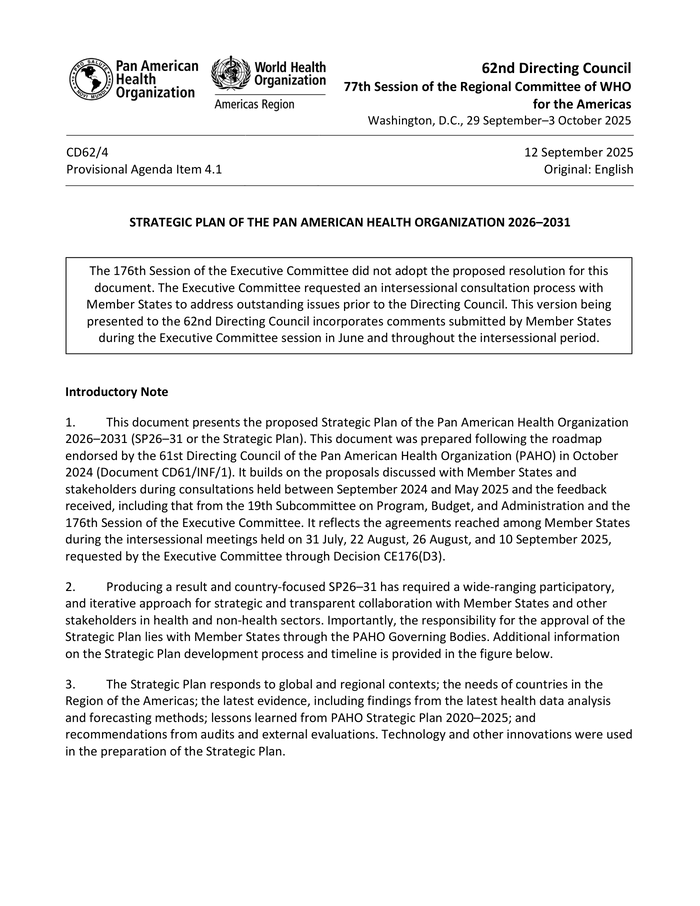
Washington, D.C., 29 September 2025 (PAHO) – The Pan American Health Organization (PAHO) has launched its Strategic Plan for 2026-2031, setting a transformative agenda aimed at accelerating health progress across the Americas. Approved by PAHO’s 62nd Directing Council, the plan is themed “Together toward a Healthier Americas for All” and focuses on addressing critical health challenges through collective regional action.
This comprehensive plan was developed through extensive consultations with member countries and stakeholders, committing to significant health outcomes over the next six years. Key areas of focus include tackling noncommunicable diseases (NCDs), enhancing mental health, strengthening health security, addressing fragmented health systems, and eliminating communicable diseases.
“The COVID-19 pandemic taught us that the Region of the Americas is stronger when we work together,” stated Dr. Jarbas Barbosa, PAHO Director. “This Strategic Plan harnesses our collective strength to build resilient health systems, reduce disease burden, and improve health and well-being for all across the Americas.”
Building on Lessons from the Pandemic
The plan builds on the lessons learned from the COVID-19 pandemic, which exposed significant gaps in health systems but also highlighted the power of joint action. It aims for measurable impacts, such as reducing maternal mortality, reversing rising suicide rates, and eliminating diseases like leprosy and Chagas.
Five Strategic Objectives
At the heart of the Strategic Plan are five key objectives that will guide regional health initiatives through 2031:
- Accelerate efforts toward health for all: Addressing social determinants of health, environmental challenges, and risk factors.
- Build resilient health systems: Ensuring universal access to health and universal health coverage based on primary health care.
- Accelerate the disease elimination agenda: Better prevention and treatment of communicable and noncommunicable diseases, including mental health conditions.
- Enhance emergency preparedness: Improving prevention, preparedness, detection, and response to health emergencies.
- Strengthen PAHO’s leadership: Advancing regional health agendas and delivering impactful technical cooperation.
Innovations in the Strategic Plan
The new Strategic Plan introduces an integrated approach to health for all, featuring an updated results-based management framework and a streamlined results framework. By reducing the number of outcomes and indicators, the plan enhances measurability and transparency. “Indicators with realistic, evidence-based targets will sharpen our focus and enable PAHO and its Member States to work towards tangible health outcomes,” Dr. Barbosa added.
To accelerate impact, the Plan’s streamlined results framework is supported by high-impact interventions, or “accelerators,” designed to drive measurable progress and systemic transformation across various health development targets.
Accelerators for Rapid Progress
These accelerators build on existing frameworks and proven methods, offering tangible opportunities to scale up interventions rapidly and effectively. The plan also includes mechanisms for agile and transparent adjustments in response to evolving circumstances, ensuring that PAHO and its member states can adapt to changing health landscapes.
“By working together, we can overcome current challenges and accelerate progress toward health for all people in the Americas,” Dr. Barbosa concluded.
Implications and Future Steps
Thanking Member States for their collaboration in developing and approving the plan, the PAHO Director underscored that it signals a “renewed regional cooperation” and affirms countries’ commitment to improving health and well-being for all. The Strategic Plan represents a significant step forward in addressing the health challenges faced by the Americas, with a focus on collaboration and innovation.
As the plan is rolled out over the coming years, PAHO and its partners will closely monitor progress, making necessary adjustments to ensure the objectives are met. This proactive approach is expected to not only improve health outcomes but also strengthen the resilience of health systems across the region.





